Pharmacies across the United States are reporting shortages of pediatric antiviral medications in addition to antibiotics, further straining the nation’s healthcare infrastructure amid a severe respiratory illness season. Here’s everything that parents need to know.
As SheKnows previously reported, hospitals nationwide have spent the past month battling an early and “unprecedented” surge in pediatric cases of respiratory syncytial virus (RSV), a common illness that can pose a serious threat to very young or immunocompromised patients. This outbreak, coupled with an early cold and flu season, has led to shortages of key medications prescribed to sick children — first the antibiotic Amoxicillin, and now the antiviral oseltamivir, a.k.a. Tamiflu.
Tamiflu is prescribed to patients with influenza. Amoxicillin is used to treat a wide range of bacterial infections, which can occur as a secondary effect of viral illnesses like the flu or RSV.
“In my 25 years of being a pediatrician, I’ve never seen anything like this,” Dr. Stacene Maroushek, a pediatric infectious disease specialist at Hennepin Healthcare, told CNN. “I have seen families who just aren’t getting a break. They have one viral illness after another. And now there’s the secondary effect of ear infections and pneumonia that are prompting amoxicillin shortages.”
This year’s intense respiratory illness season has also prompted a shortage in pediatric hospital beds in many regions of the country. As CBS News reported last week, hospitals in 10 states are at or above 80 percent capacity in their pediatric ICUs. Kimberly Whalen, nursing director at Mass General Hospital for Children, told the news outlet there are “no PICU beds in the Northeast.” It’s so bad that the Children’s Hospital Association and the American Academy of Pediatrics have asked the Biden administration to declare a public health emergency.
It’s certainly a scary moment for parents, especially for those with infants or immunocompromised children. So what can parents do to keep their kids healthy?
First things first — don’t panic. There are a number of simple and effective tools at your disposal to prevent contracting RSV, the flu, and other respiratory illnesses. The Centers for Disease Control and Prevention (CDC) recommends washing your hands regularly, practicing proper sneezing and coughing etiquette, disinfecting communal surfaces, and avoiding contact with sick people. Parents of children at high risk of severe illness from RSV might consider keeping their kids home from congregate settings like school or daycare, where the virus can spread quickly. COVID-19 is still a thing, so sending your child to school or daycare with an effective face mask can’t hurt, either.
In the event that your child falls ill, parents should be diligent about getting them tested to determine whether their illness is viral or bacterial. This will help providers quickly assess what kind of pharmaceutical intervention your child might need, if any.
“We don’t want to treat somebody that has COVID-19 with an antibiotic, because it’s not going to be effective,” Brigid Groves, senior director for practice and professional affairs at the American Pharmacists Association, told CNN. “And then we also run the risk of creating more resistance in our current bacterial antimicrobial agents out there.”
Parents should also mentally prepare themselves to hunt down medications. Depending on the severity of shortages in your area, you might have to visit a different pharmacy or travel to a neighboring city to fill your child’s prescription. Know that the Food and Drug Administration is aware of these ongoing shortages and has reportedly issued new guidances for pharmacists.
Be sure to monitor your child’s symptoms and take them to a hospital immediately if you notice them struggling to breathe or turning blue. These are signs of a more severe illness that requires in-hospital treatment, such as oxygen, IV fluids, or mechanical ventilation. The good news? The CDC says most pediatric patients “improve with this type of supportive care and are discharged in a few days.”
And by all means, keep your sick child home from school, daycare, and any other congregate setting where they might infect other kids. If the COVID-19 pandemic has taught us anything, it’s that we all have a responsibility to look out for each other.
Before you go, check out the natural cold and cough products we swear by for kids:
Source: Read Full Article


